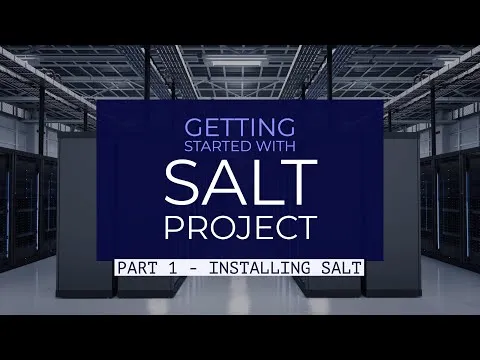
Introduction to Salt Project 
Learn how to become a confident Salt user with the Introduction to Salt Project course. Whether you're a DevOps engineer, system administrator, or simply interested in open-source Salt, this course will equip you with the skills needed to effectively use this powerful orchestration platform. From understanding basic Salt concepts to writing clean Salt formulas for configuration management, you'll explore remote execution features, targeting, and configuration management states. With hands-on practice, you'll also learn how to add logic using the templating language Jinja and utilize Salt's YAML-based data store called pillar. Don't miss out on becoming an efficient Salt user for any infrastructure size. ▼
ADVERTISEMENT
Course Feature
![]() Cost:
Cost:
Free Trial
![]() Provider:
Provider:
A Cloud Guru
![]() Certificate:
Certificate:
Paid Certification
![]() Language:
Language:
English
![]() Start Date:
Start Date:
On-Demand
Course Overview
❗The content presented here is sourced directly from A Cloud Guru platform. For comprehensive course details, including enrollment information, simply click on the 'Go to class' link on our website.
Updated in [September 26th, 2023]
What does this course tell?
(Please note that the following overview content is from the original platform)
Introduction to Salt Project aims to provide DevOps engineers system administrators and anyone interested in using open-source Salt with the skills needed to not just get started using this robust orchestration platform but also write clean Salt formulas for configuration managementBeginning with reviewing basic Salt concepts and architectures we'll create a Salt environment and then use that environment to explore Salt's remote execution features and targeting Once we have this core system down we'll learn how it works as the basis for Salt's configuration management states We'll write our own states and formula and then learn how to add logic to these with the templating language Jinja Finally we'll close out the course by getting hands-on with Salt's YAML-based data store called pillarOnce finished you'll become a confident Salt user for remote execution and configuration management able to write efficient states and formulas to manage any size of infrastructure
We considered the value of this course from many aspects, and finally summarized it for you from two aspects: skills and knowledge, and the people who benefit from it:
(Please note that our content is optimized through artificial intelligence tools and carefully reviewed by our editorial staff.)
What skills and knowledge will you acquire during this course?During the Introduction to Salt Project course, participants will acquire the following skills and knowledge:
1. Understanding of basic Salt concepts and architectures.
2. Ability to create a Salt environment and utilize its remote execution features.
3. Proficiency in targeting specific systems using Salt.
4. Knowledge of Salt's configuration management states and how they work.
5. Ability to write clean and efficient Salt states and formulas for configuration management.
6. Understanding of how to add logic to Salt states using the Jinja templating language.
7. Hands-on experience with Salt's YAML-based data store called pillar.
8. Confidence in using Salt for remote execution and configuration management.
9. Ability to manage infrastructure of any size using Salt.
By the end of the course, participants will be equipped with the necessary skills to effectively use Salt as a robust orchestration platform and write clean Salt formulas for configuration management.
Who will benefit from this course?
The course "Introduction to Salt Project" will benefit the following individuals:
1. DevOps Engineers: DevOps engineers will benefit from this course as it provides them with the skills needed to effectively use Salt as an orchestration platform. They will learn how to create a Salt environment, utilize remote execution features, and write clean Salt formulas for configuration management. This knowledge will enable them to efficiently manage and automate infrastructure tasks.
2. System Administrators: System administrators will find value in this course as it equips them with the necessary skills to utilize Salt for configuration management. They will learn how to write states and formulas, add logic using Jinja templating language, and work with Salt's YAML-based data store called pillar. This knowledge will enable them to streamline and automate their system administration tasks.
3. Anyone interested in using open-source Salt: This course is also suitable for individuals who are interested in learning and using open-source Salt. It provides a comprehensive introduction to Salt concepts, architectures, and functionalities. By the end of the course, participants will become confident Salt users, capable of remote execution and configuration management, and able to write efficient states and formulas for managing any size of infrastructure.
Course Provider

Provider A Cloud Guru's Stats at AZClass
Discussion and Reviews
0.0 (Based on 0 reviews)
Explore Similar Online Courses

Acrylic Painting: Learn the Basics For Beginners

Roadmap to success for web entrepreneurs

Python for Informatics: Exploring Information

Social Network Analysis

Introduction to Systematic Review and Meta-Analysis

The Analytics Edge

DCO042 - Python For Informatics

Causal Diagrams: Draw Your Assumptions Before Your Conclusions

Whole genome sequencing of bacterial genomes - tools and applications

What is Salt How to Configure Salt How to use saltstack salt ssh Part-1

Installing Salt - Getting Started With Salt Project - Part 1


Start your review of Introduction to Salt Project